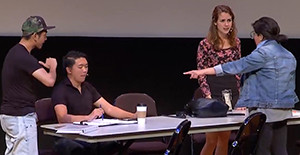The Spring 2016 Teaching Conference provided an orientation for graduate students new to the GSI role. Discipline-Cluster (D-C) workshops led by experienced GSIs addressed pressing questions about getting started as a GSI. The afternoon featured a performance by Berkeley Interactive Theater, which led to a discussion of how GSIs in their role as teachers can respond to microaggressions while maintaining respect for the individuals involved.
“I learned so many things I was unaware of about being a GSI.”Computer Science
“Forced me to think more deeply about my role as a GSI.”Social Welfare
Discipline-Cluster Workshops
The D-C workshops grouped GSIs working in similar teaching assignments to address core topics for the first weeks of teaching, such as getting started as a GSI; conducting the first session of section, lab, or studio; strategies to enhance students’ learning; time management; and troubleshooting problem scenarios that can arise in teaching. Experienced GSIs in several disciplines led the workshops, so first-time GSIs benefited from their knowledge of Cal students and of GSI responsibilities in their particular instructional setting.
Berkeley Interactive Theater Performance
“The theater performance was very effective at highlighting sensitive issues and opening up space to discuss from a common experience.”
“Very intense, captivating, eye opening. It was great, I would give it to everyone, professors, mentors, leaders.”
“Active Participation,” a brief play by Berkeley Interactive Theater, depicted an office-hour meeting among three students and their GSI in which the GSI tries to sort out how the students distributed duties in a group project. The scene is peppered with microaggressions, accusations, and challenges to the GSI’s authority, which the GSI struggles to respond to. After the short scene, audience members asked the characters questions about their behavior and motivations during the scene. The interactive performance served as the basis of an in-depth, participatory exploration of microaggressions, multiple perspectives on social situations, and productive ways that GSIs in their role as teachers can respond to microaggressions while maintaining respect for the individuals involved.
An upcoming GSI Center workshop, Creating Inclusive Classrooms, aims to further assist GSIs in understanding the character and consequences of microaggressions and in developing skills to identify and respond to them if they occur. The workshop is scheduled for Tuesday, February 23, from 1:00 to 2:30 pm.
Here are more resources on the topic of microaggressions:
Tool: Recognizing Microaggressions (pdf)
Tool: Interrupting Microaggressions (pdf)
Creating Inclusive Classrooms for Trans* and Gender Expansive Students (GenEq website)
GSI Resources Handout: Inclusion and Well-Being (pdf)
Online GSI Professional Standards and Ethics in Teaching course
Workshops on Teaching series
GSI teaching consultations


